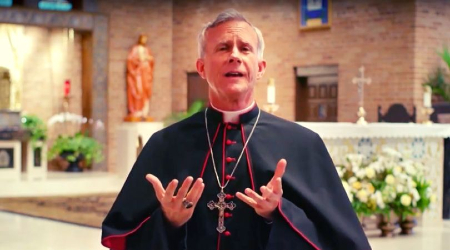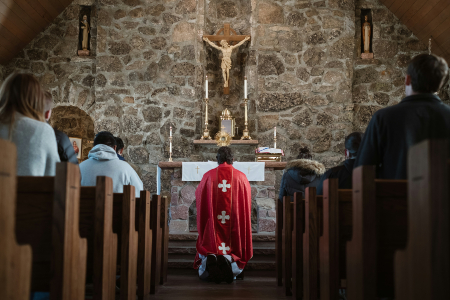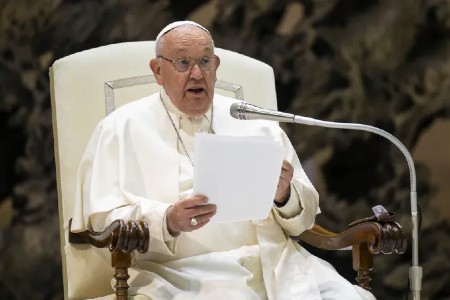Read Bishop Joseph Strickland's Pastoral Letter
FREE Catholic Classes
My Dear Sons and Daughters in Christ,
It has been an honor and a joy to share some basic and essential truths of the Catholic faith with you through this series of Pastoral Letters. Today I would like to discuss the seventh and final truth that I listed in my Pastoral Letter of August 22, 2023:
We ask you, humbly: don't scroll away.
Hi readers, it seems you use Catholic Online a lot; that's great! It's a little awkward to ask, but we need your help. If you have already donated, we sincerely thank you. We're not salespeople, but we depend on donations averaging $14.76 and fewer than 1% of readers give. If you donate just $5.00, the price of your coffee, Catholic Online School could keep thriving. Thank you.Help Now >

Highlights
10/17/2023 (6 months ago)
Published in Living Faith
Keywords: Bishop Joseph Strickland, Letter, Pastoral, Bible, Jesus, Cross, Meaning
"In order to follow Jesus Christ, we must willingly choose to take up our cross instead of attempting to avoid the cross and suffering that Our Lord offers to each of us individually in our daily lives. The mystery of redemptive suffering -- i.e. suffering that Our Lord allows us to experience and accept in this world and then offer back to Him in union with His suffering -- humbles us, purifies us, and draws us deeper into the joy of a life lived in Christ. That is not to say that we must enjoy or seek out suffering, but if we are united to Christ, as we experience our daily sufferings we can find the hope and joy that exist amidst the suffering and persevere to the end in all our suffering. (cf. 2 Tim 4:6-8)."
The question of why suffering is woven into our human existence has preoccupied and perplexed humanity since the dawn of history. Suffering seems to be a great mystery, and when we are in the midst of it, we might ask, "Why does it have to be this way? Why does God allow us to suffer if He loves us?" The ultimate answer to these questions is this -- free will. God created us, He loves us, and He wants the very best for us in every way; He wants us to live forever in Heaven with Him in a loving relationship. However, to be in an eternal, loving relationship with Him, we have to accept His love and then choose to love Him back because love is only possible if one has a choice to love or not to love. God, who is love, will not force us to love Him and spend eternity with Him against our will because that would not be love.
Our first parents, Adam and Eve, chose to disobey God-- an act contrary to love -- and thereby sin and death were introduced into the world. As the Catechism of the Catholic Church states: "Man, tempted by the devil, let his trust in his Creator die in his heart and, abusing his freedom, disobeyed God's command.This is what man's first sin consisted of All subsequent sin would be disobedience toward God and lack of trust in his goodness." (CCC 397).
However, God sent a new Adam -- His Divine Son, Jesus -- to redeem us from both the original sin committed by our first parents, as well as the personal sin we each commit in our own lives through our thoughts, words, deeds, and omissions. This act of perfect sacrifice by Jesus Christ on the cross shows us the model of how suffering can be redemptive, and it forms the basis for a concept the Church knows as the Economy of Salvation, whereby we recognize God's activity in governing the world, particularly regarding our salvation won by Christ. When we embrace the mystery of suffering in God's Economy of Salvation, and when we come to recognize that our pain is actually an invitation to participate with Christ on the cross, we find not only meaning, but even a profound beauty in suffering as it humbles us, purifies us, and conforms us to Christ in a way nothing else could. It can oftentimes be difficult for us to recognize the good that comes from suffering when we are undergoing it, but it is typically in those times of suffering when God is refining us the most.
We ask you, humbly: don't scroll away.
Hi readers, it seems you use Catholic Online a lot; that's great! It's a little awkward to ask, but we need your help. If you have already donated, we sincerely thank you. We're not salespeople, but we depend on donations averaging $14.76 and fewer than 1% of readers give. If you donate just $5.00, the price of your coffee, Catholic Online School could keep thriving. Thank you.Help Now >
It is important for us to recognize in our suffering that God's will for us always includes mercy, and that trust in God involves believing He loves us perfectly, and that He has compassion for us. However, this can be difficult to realize and accept, especially when there seems to be no relief of the pain, no healing from disease, etc. However, when God provided the ultimate sacrifice, His Divine Son, this sacrifice covered the whole world with His compassion and His mercy. The suffering of Christ on the cross -- our sign of hope and of eternal life -- allows us the opportunity to enter into that hope and that promise by uniting our suffering with His, and to recognize that within our pain and suffering can be found the immense compassion and mercy of God.
How, though, can our suffering become redemptive? The Catechism of the Catholic Church teaches that all suffering "can also have a redemptive meaning for the sins of others" if we unite it to Christ's passion. (CCC 1502). "...Christ not only allows himself to be touched by the sick, but he makes their miseries his own ... By his passion and death on the cross Christ has given a new meaning to suffering: it can henceforth configure us to him and unite us with his redemptive Passion." (CCC 1505). Suffering in union with the passion of Christ "acquires a new meaning; it becomes a participation in the saving work of Jesus." (CCC 1521).
Redemptive suffering is a beautiful and perfect love. We are able to suffer redemptively only through the grace of Christ. You might sometimes hear Catholics say about suffering -- "offer it up." That is because suffering can have a purpose when it is united with Christ on the cross. It can bring much hope and joy into your life even in the midst of suffering to know that something beautiful is being brought about from something difficult. The important thing to realize is that redemptive suffering is not something you go through alone -- Christ is with you, experiencing it with you! In our suffering which is offered to Christ, He draws us into Himself and into His Sacred Heart.
"Offering it up" transforms suffering from misery into love. However, when someone is in the midst of deep suffering, it can sound dismissive to tell them to "offer it up." We must be empathetic to those who suffer, for it is sometimes difficult to see how suffering can be redemptive when one is in the midst of terrible suffering, or if a child or a loved one is suffering. However, we can pray not only to offer up our own sufferings for the sake of others, but we can pray also that the Lord will use the sufferings of others for their own purification and spiritual growth, even if they cannot see to do so themselves. All suffering, when united with Christ's suffering, is redemptive. As St. Paul tells us, "Now I rejoice in my sufferings for your sake, and in my flesh I am filling up what is lacking in the afflictions of Christ on behalf of his body, which is the church..." (Col 1:24). Christ's sacrifice on the cross was perfect, but what is lacking from His perfect sacrifice? Only our participation in it. Christ's perfect sacrifice on the cross destroyed death and the eternal effects of sin. And in our suffering, united with His, He gives us the power to participate in the salvation He won for us.
Suffering can bring a profound loneliness at times. However, it is this loneliness which can cause us to reach out, past earthly comfort, to the One who calls us to participate in the mystery of suffering with Him. Jesus chose to enter into our loneliness by becoming human. He experienced profound loneliness in the Garden of Gethsemane, where he underwent His agony as He prepared for His impending death, and even His disciples did not stay awake with Him. (cf. Matt 26:36-45). On the cross Jesus cried out, "My God, my God, why have you forsaken me?" (Matt. 27:46). By His Passion, Jesus endured the ultimate loneliness in order to fill our loneliness with His presence, and in our suffering, He is profoundly present.
As disciples of Jesus Christ, we are not called to seek out suffering, but when God allows suffering to come into our lives, we are called to accept the cross He offers us and embrace the work God is performing in our souls as necessary for our purification and sanctification. Although He was sinless, Jesus gave us a perfect model to follow: "Surely he did not help angels but rather the descendants of Abraham; therefore, he had to become like his brothers in every way, that he might be a merciful and faithful high priest before God to expiate the sins of the people. Because he himself was tested through what he suffered, he is able to help those who are being tested." (Heb 2:16-18). Jesus beautifully demonstrates this in the Garden of Gethsemane as He says, "My Father, if it is possible, let this cup pass from me; yet, not as I will, but as you will." (Matt 26:39). Many great saints throughout the ages have also embraced this essential reality of the cross in their lives and have given us an example of embracing suffering.
Pope St. John Paul II left us a beautiful apostolic letter, Salvifici Doloris, in which he contemplates the role of suffering in salvation history, including how Our Blessed Mother exemplifies what it means to share in Christ's suffering: "'... As a witness to her Son's Passion by her presence, and as a sharer in it by her compassion, Mary offered a unique contribution to the Gospel of suffering,' ... She truly has a special title to be able to claim that she 'completes in her flesh' -- as already in her heart -- 'what is lacking in Christ's afflictions.'" (Salvifici Doloris, para. 25)
 Hi readers, it seems you use Catholic Online a lot; that's great! It's a little awkward to ask, but we need your help. If you have already donated, we sincerely thank you. We're not salespeople, but we depend on donations averaging $14.76 and fewer than 1% of readers give. If you donate just $5.00, the price of your coffee, Catholic Online School could keep thriving. Thank you. Help Now >
Hi readers, it seems you use Catholic Online a lot; that's great! It's a little awkward to ask, but we need your help. If you have already donated, we sincerely thank you. We're not salespeople, but we depend on donations averaging $14.76 and fewer than 1% of readers give. If you donate just $5.00, the price of your coffee, Catholic Online School could keep thriving. Thank you. Help Now >
St. Gemma Galgani, also known as the Flower of Lucca, was a mystic who was born in 1878 in Italy. Throughout her life she had many mystical experiences. She suffered greatly, and she died of tuberculosis at age 25. She gave us this beautiful message on suffering: "Jesus once said to me, 'Do you know, daughter, for what reason I send crosses to souls dear to me? I desire to possess their souls, entirely, and for this I surround them with crosses, and I enclose them in sufferings and tribulation, that they may not escape from my hands; and for this I scatter thorns, that souls may fasten their affections upon no one, but find all content in Me alone. My daughter, if you do not feel the cross, it cannot be called a cross. Be sure that under the cross you will not be lost." (St Gemma Galgani, Letter to Monsignor Volpi)
As we have looked at some basic truths of our Catholic faith in this series of Pastoral Letters, we have seen the cooperative and complementary nature of the sacraments as part of God's Divine Economy of Salvation. We have looked at suffering in this letter; therefore, let us now turn to the sacrament of the Anointing of the Sick (sometimes referred to as Extreme Unction) as we reflect on the cross in our lives. Like all the sacraments, Anointing of the Sick shows us Christ is present in His Church; in this case, He is most present to us as our healing Lord. The very same Jesus who restored sight to the blind man, and who healed the woman with a hemorrhage is present to suffering souls through the ministry of His priests; and through those priests, Our Lord can bring healing of body, mind, and spirit in this sacrament. It is important to note, however, that although this sacrament is typically administered to those who are suffering from a serious physical condition, the most important effect of Anointing of the Sick is spiritual strengthening, spiritual healing, and forgiveness of sins which God imparts through this sacrament. Therefore, although a person who receives this sacrament may receive the grace of a physical healing if that is in alignment with God's will; the individual will always receive the invisible grace of spiritual healing, even if there are no visible signs of physical healing.
From the Catechism of the Catholic Church, we understand that: "The special grace of the sacrament of the Anointing of the Sick has as its effects: the uniting of the sick person to the passion of Christ, for his own good and that of the whole Church; the strengthening, peace, and courage to endure in a Christian manner the sufferings of illness or old age; the forgiveness of sins, if the sick person was not able to obtain it through the sacrament of Penance; the restoration of health, if it is conducive to the salvation of his soul; the preparation for passing over to eternal life." (CCC 1532). A person does not necessarily have to be close to death in order to receive the Anointing of the Sick, and this sacrament can be received as many times as is proper throughout a person's life when God's physical and/or spiritual healing is sought. For those close to death, a priest can perform a specific set of prayers and sacramental activities known as Last Rites, which include the Sacrament of the Anointing of the Sick, and typically a final Reconciliation (if possible), and a final reception of the Eucharist (if possible), which is known as Viaticum.
Before closing this discussion on suffering, I would like to state that there are many in the world who suffer for their faith because of attacks by their own government, or from others who are hostile to Christ and His Church. Our Lord walks especially close to these suffering souls. Let us pray for them constantly. There are many, many saints who stand ready to assist them; let us pray for their intercession. However, I also want to mention, especially in this time of the Synod on Synodality, that we are in a unique time now as there are many who are suffering for their faith as they attempt to defend the Deposit of Faith due to attacks from within the Church herself. I would call on those who are being persecuted in this manner to remember that they also walk in the footprints of Jesus Christ, and that there are also many saints who have been persecuted by those in Christ's Church who should, above all, uphold His truth. Let us all stand firm and not waver, and let us say with St. Ignatius of Antioch: "... Come fire and cross and grapplings with wild beasts ..., wrenching of bones, hacking of limbs, crushings of my whole body, come cruel tortures of the devil to assail me. Only be it mine to attain unto Jesus Christ." (Letter from St. Ignatius to the Romans, chapter 5, verse 3).
In conclusion, Christ is our example of how to suffer, and He will teach us as we unite our sufferings to His. He promises that His grace is sufficient and available to all. He offers His divine life to us in the midst of our sufferings through the sacraments. I urge you, my dear sons and daughters in Christ -- attend Mass every Sunday and Holy Day, and strive to attend daily mass as often as you can; go to confession frequently; pray the Rosary; and call upon the saints for assistance. Rejoice that we can participate in our own redemption and the redemption of the world by denying ourselves, taking up our cross, and following Him.
May Almighty God bless you, and may you receive the strengthening, healing, and perseverance Our Lord desires for you as you offer your sufferings to Him.
I remain your humble father and servant,
Most Reverend Joseph E. StricklandBishop of Tyle
Join the Movement
When you sign up below, you don't just join an email list - you're joining an entire movement for Free world class Catholic education.
-

-
Mysteries of the Rosary
-
St. Faustina Kowalska
-
Litany of the Blessed Virgin Mary
-
Saint of the Day for Wednesday, Oct 4th, 2023
-
Popular Saints
-
St. Francis of Assisi
-
Bible
-
Female / Women Saints
-
7 Morning Prayers you need to get your day started with God
-
Litany of the Blessed Virgin Mary
U.S. Catholic Parishes Experience Resurgence of Traditional Practices
-

Pope Francis Urges Faith and Prayers for Peace
-

Florida Welcomes Volunteer Chaplains to Public Schools
-
10 Fascinating Details About St. Joseph the Worker: Celebrating His Feast Day - May 1
-
St. Joseph the Worker: Model for Men, Young and Old
Daily Catholic
 Daily Readings for Friday, May 03, 2024
Daily Readings for Friday, May 03, 2024 St. James the Lesser: Saint of the Day for Friday, May 03, 2024
St. James the Lesser: Saint of the Day for Friday, May 03, 2024 Prayer before Starting on a Journey: Prayer of the Day for Friday, May 03, 2024
Prayer before Starting on a Journey: Prayer of the Day for Friday, May 03, 2024- Daily Readings for Thursday, May 02, 2024
- St. Athanasius: Saint of the Day for Thursday, May 02, 2024
- The Our Father: Prayer of the Day for Thursday, May 02, 2024
![]()
Copyright 2024 Catholic Online. All materials contained on this site, whether written, audible or visual are the exclusive property of Catholic Online and are protected under U.S. and International copyright laws, © Copyright 2024 Catholic Online. Any unauthorized use, without prior written consent of Catholic Online is strictly forbidden and prohibited.
Catholic Online is a Project of Your Catholic Voice Foundation, a Not-for-Profit Corporation. Your Catholic Voice Foundation has been granted a recognition of tax exemption under Section 501(c)(3) of the Internal Revenue Code. Federal Tax Identification Number: 81-0596847. Your gift is tax-deductible as allowed by law.









 Daily Readings for Friday, May 03, 2024
Daily Readings for Friday, May 03, 2024 St. James the Lesser: Saint of the Day for Friday, May 03, 2024
St. James the Lesser: Saint of the Day for Friday, May 03, 2024 Prayer before Starting on a Journey: Prayer of the Day for Friday, May 03, 2024
Prayer before Starting on a Journey: Prayer of the Day for Friday, May 03, 2024

